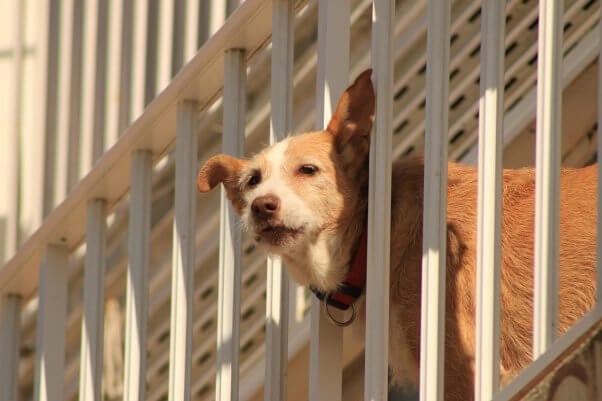Why You Should NEVER Leave Your Dog Alone on a Balcony
If your dog joins you for a morning coffee break or a Zoom meeting on the balcony, the situation can be a win-win: Your animal companion can get some stimulation outside while someone is there to make sure everything’s OK, and you can spend some time with your dog. However, just as leaving a dog chained in a backyard is a very bad idea, so is leaving your dog on a balcony. If you’ve wondered “Is it safe to leave my dog on the balcony?” PETA has the answers:
Should I Leave My Dog on the Balcony?
Leaving a dog outside on a balcony for hours at a time is cruel. Dogs belong indoors with their family. Even a covered balcony doesn’t protect dogs from the elements in any substantial way, and those left outside can suffer from life-threatening conditions due to intense weather—like the dog who died after being left in the sun on a balcony in California for several hours. There are also many stories of dogs becoming frustrated or overstimulated by birds or other animals in neighboring buildings, or on the street, which can lead dogs to wriggle in between bars on the balcony and fall or become stuck.
Dogs left on balconies can suffer from the following:
- Anxiety
- Isolation
- Starvation
- Dehydration
- Heatstroke or hypothermia (even when the weather seems mild)
- Other conditions from being exposed to unpredictable and extreme weather
What to Do if You Spot a Dog Suffering on a Balcony
While you may not see many dogs left alone on balconies in your community, ask yourself how often you look up: Spotting one on a high-rise’s balcony is no easy feat. Unfortunately, the problem is widespread, and incidents of “high rise syndrome,” in which animals fall several stories, have been recorded in Canada, Mexico, the U.S., and elsewhere, particularly during warmer months.
So if you look up and see a dog unattended on a balcony, be sure to document the incident (take a photo and write down the address, date, and time) and reach out to the dog’s guardian if you’re able to or speak to local authorities.
What You Need to Know to Keep Your Animal Companions Safe in Extreme Weather
- Keep animals indoors. Unlike humans, dogs’ primary method of cooling themselves is through panting, so even short walks can have life-threatening consequences. Never leave your dog on a balcony unattended, and during extremely hot and cold times of the day, don’t allow them on the balcony at all. Dogs can develop heatstroke very quickly in hot and humid weather. Without fresh drinking water, which many dogs kept outside on balconies don’t have access to, the heat can become deadly within minutes. To help your animal companion expel extra energy safely, walk them early in the morning or late in the evening, when it’s cooler outside, and play with them indoors.
- Never leave your dog in the car—even “just for a minute.” Dogs can suffer and die when their guardians make the mistake of leaving them in a car unattended. Parked cars are death traps for dogs: On a 70-degree day, the temperature inside a vehicle can soar to 99 degrees in 20 minutes, and on a 90-degree day, the interior temperature can reach as high as 109 degrees in just 10 minutes.
If you see a dog left alone in a hot car, note the vehicle’s color, make, model, and license plate number. Have someone keep an eye on the dog and have the car’s owner paged inside the nearest buildings, and if they don’t show up immediately, call the police. Don’t leave the scene until the situation has been resolved. Learn more by reading PETA’s step-by-step guide to helping a dog trapped in a car.
- Avoid hot pavement. When outdoor temperatures reach the 80s, asphalt temperatures can climb to 140 degrees, causing pain, burns, and permanent damage to dogs’ paws after just a few minutes of contact. If it’s too hot for you to walk barefoot, it’s too hot for your dog. Walk them on grass whenever possible, and avoid walking in the middle of the day. Always bring extra water. Never run with dogs in hot weather—they’ll collapse before giving up, at which point it may be too late to save them.


